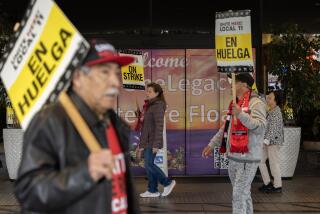British government workers stage 24-hour strike
Hundreds of thousands of teachers, police workers, immigration officers and other government employees walked off the job Thursday across Britain in a mass strike that could augur a summer of industrial action over deep cuts in public spending.
The picket lines went up to protest proposed changes to state-sponsored pension plans, which would require public-sector workers to increase their contributions, retire later and collect less than they do now. The government says overhauling the system is imperative in light of the country’s huge budget deficit and Britons’ longer lifespans.
Though there have been several large protests this year of the government’s far-reaching austerity program, Thursday’s strike was the first wide-scale action and was being viewed as a test run for potentially more to come.
Union leaders and politicians alike are eager to see whether fellow Britons blame the government or the workers for the disruption. The 24-hour walkout came even though the two sides are still in negotiations, with some observers saying a compromise is possible.
The unions declared the strike a success, estimating that up to 750,000 employees, mostly teachers, took part. Classes were canceled at more than 10,000 schools across England and Wales. Some passport-control officers at airports across the country began striking Wednesday night.
Britain’s ruling coalition, led by the Conservative Party, downplayed the strike’s effects. Officials said airports and ports were operating normally, courthouses continued hearing cases and fewer civil servants turned out for the strike than the unions had predicted.
This week, Prime Minister David Cameron appealed to workers to stay on the job. But Emily Cotterill, a history teacher in East London, said she had no choice but to participate.
“We have to go on strike to protect ourselves.... No one’s asking for the moon on a stick, just for things to be fairer,” said Cotterill, 27, who joined her colleagues in a noisy march through downtown London. “It will raise awareness at least. And if things don’t change, there are likely to be other strikes.”
The demonstration here in the capital was mostly a peaceful affair, although a few scuffles broke out between police and suspected anarchists in hooded shirts. Security was heavy around Parliament and along Whitehall, the government quarter.
The planned pension changes are part of the government’s effort to rein in spending and pare down a public debt that is among the largest in Europe. The Conservative-led coalition has pushed through a plan to slash the budget by a $130 billion in four years, the deepest cuts in a generation, which will leave almost no element of public services untouched. Nearly half a million state jobs are to be axed.
Union activists have promised to keep up their protest against the cuts, which are expected to bite later this year.
But public support for strikes has waned over the years in Britain, making such action politically trickier than before. That has been evident in the reaction of the opposition Labor Party, which despite its name decided to join the government in criticizing Thursday’s walkout.
“These strikes are wrong at a time when negotiations are still going on,” Labor leader Ed Miliband told the BBC. “After today’s disruption I urge both sides to put aside the rhetoric, get round the negotiation table, and stop it happening again.”
More to Read
Start your day right
Sign up for Essential California for news, features and recommendations from the L.A. Times and beyond in your inbox six days a week.
You may occasionally receive promotional content from the Los Angeles Times.







